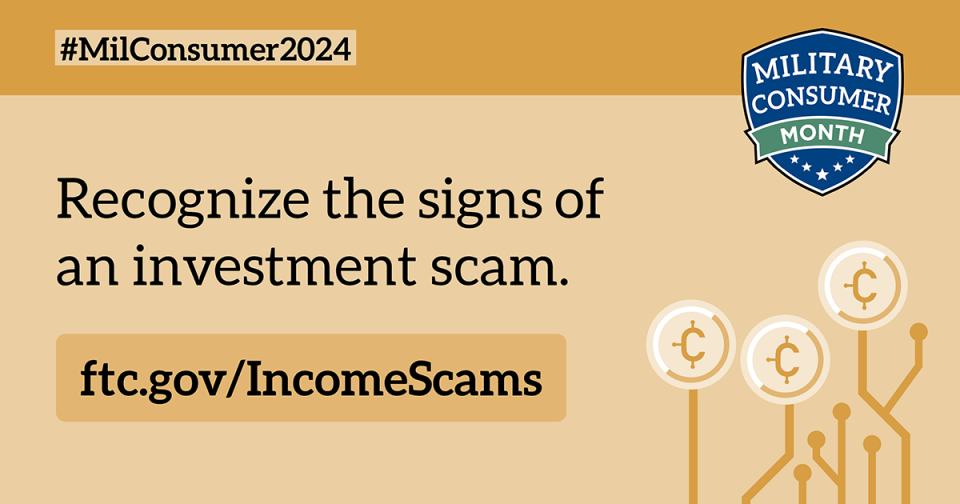Investment scammers claim you’ll get big returns investing in a hot new money-making “opportunity” — maybe something like cryptocurrency. Some scammers say you’ll likely make a lot of money if you follow their proven system or method. But will you?
We know that there are plenty of scammers hawking phony investment opportunities. In 2023, people told the FTC that they lost $4.6 billion to investment scams — more than any other category. And military consumers reported high median losses to investment scams: $7,000. What do you need to know to avoid investment scams?
One big red flag is if someone pressures you to commit quickly. Scammers want you to act fast and might tell you that space is limited or that you’re getting a special deal that will expire soon. They don’t want you to take time to research them or their offer. Here are some steps to take if you’re considering an investment opportunity.
- Do some homework. Search online for the name of the company or program and words like “review,” “scam,” “fraud,” or “complaint.” Other people’s experience with the company can alert you to possible problems. Visit Investor.gov, a U.S. Securities and Exchange Commission (SEC) website, for more advice on investing and avoiding fraud.
- Verify investment claims on your own. Never put money into an investment based only on what someone claims or what you read in an online newsletter, review, or blog. Scammers will often invent stories or testimonials about how successful people are at making money with their investment offer.
- Know the risk. There are no guaranteed returns — and no investments without risks. Don’t trust anyone who plays down the risk of an investment or who acts like risk disclosures are just a formality or something you don’t need to worry about.


In 2022 shortly after moving to Las Vegas I was approached by a friend of a family member.
I am a disabled Senior Citizen and was scammed out of 20K for a phoney Real Estate Investment investment. I filed a police report with the LVMPD but nothing was done to help me. How do I get my 20K back?
In reply to In 2022 shortly after moving… by Gracie McIntosh
Each state has a fraud division in its attorney general's office. I suggest you start there.
In reply to In 2022 shortly after moving… by Gracie McIntosh
Your money is gone. I’m sry
Thanks for the information.
As a certified Fraud Examiner (CFE) specializing in aggressive "financial advisor" sales practices, I would also advise consumers to go to the Financial Industry Regulatory Authority (FINRA) and check out a salesperson's background & disciplinary history:
https://brokercheck.finra.org/
I've been a victim of this kind of stuff and it is not a good feeling so thanks to the FTC for all that they are doing to bring awareness to these scammers.
The investment scams as so pervasive in recent years, I trust none of them on the Internet, especially if posted to any sort of social media.
I value my retirement savings too much, so I play it safe: I only invest where I can walk into the place, and talk to a real person, face to face.
This method has worked fine for me, for well over 50 years.
Thank you! So helpful!
Thank you for taking out the time to inform Seniors, who are unaware of this type of deceit.
Thank-You for sharing your research.
More warnings and advice from the Government. No mention of anybody being jailed for all the scams, of foreign country's being sanctioned for supporting their crooks.. Also, reporting is a very complex process and there are dozens of different places to report. What is needed is a national 911-type phone number and e-mail address for all suspected scams of all types. Then, government AI could separate wheat from chaff, refer the customer (with links) to appropriate agencies to deal with the particular issue, and suggest references for the customer to further investigate. Make it simple with one national phone number and e-mail address to report EVERYTHING.
In reply to More warnings and advice… by William Cline
Read about FTC legal activity at https://www.ftc.gov/news-events/news/press-releases.
Report fraud, scams, and bad business practices to the FTC at www.ReportFraud.ftc.gov. The information you give goes into a secure database that law enforcement agencies nationwide use for investigations and to build cases.
What they dont,say is the amt is 50,000. They waste ur time I'm done w/these people!!!!!